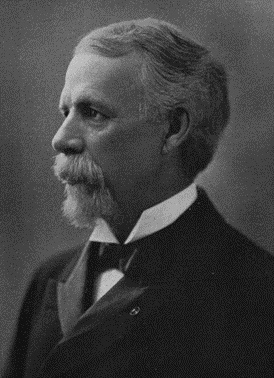Why Alger Falls?


Who was he? Why were the falls named after him?
Alger Falls is hard to miss. It’s located at the junction of Michigan highway M-94 and M-24 just outside of Munising in Michigan’s Upper Peninsula.
People are attracted to the falls. It’s close to town, easy to see, and features a series of beautiful cascades.
Russell Alger


Alger in 1900, in a portrait by Percy Ives
Roger Alger was born in Ohio in 1836. Orphaned at twelve, he supported his two younger siblings. Alger worked on a farm, attended school, taught for two winters, studied law, and began practice in Cleveland, Ohio in 1859.
He moved to Grand Rapids, Michigan in 1860 where he married Annette Henry in 1861 and started in the lumber business.
From Private to General
Alger enlisted as a private in the Union Army 1861. He was commissioned and served as a captain and then major in the 2nd Michigan Cavalry Regiment. At the Battle of Boonesville in 1862, Colonel Phil Sheridan sent him to attack the enemy's rear with ninety men. The rebels were soundly defeated. Despite being wounded and taken prisoner, he escaped the same day.
Alger was promoted again to lieutenant colonel of the 6th Michigan Cavalry and then to colonel of the 5th Michigan Cavalry. Alger’s was the first command to enter Gettysburg on June 28, 1863. He was specially mentioned in General Custer’s report on cavalry operations.
A little over a week later, he was severely wounded. Alger recovered and went on to participate in General Sheridan's 1864 Virginia Valley Campaign. His brilliant cavalry charge at Trevilian Station captured a large force of Confederates.
In just three years, Alger had fought in 66 different battles and skirmishes. He resigned from the Army on September 20, 1864. In 1867, he was awarded the rank of Brevet Major General.
Businessman and Politician
After the war, Alger settled in Detroit as head of Alger, Smith & Company, and the Manistique Lumbering Company. His 100 square mile pine forest produced more than 75 million board feet of lumber annually.
Elected governor of Michigan from 1885–1886, his ardent support of then candidate William McKinley led to his appointment as Secretary of War in 1897.
Alger was criticized for the inadequate preparation and inefficient operation of the department during the Spanish-American War. Of note is the Army beef scandal.
He hurriedly arranged a low-cost meat contract to feed Army soldiers in the Spanish-American war. Chicago’s "Big Three" meatpacking corporations, Morris & Co, Swift & Co, and Armour & Co took advantage of Alger's inattention and favorable attitude to the industry. The “embalmed beef” product they shipped was so poorly preserved, chemically adulterated, and spoiled that it was dangerous to consume.
"Algerism" became a synonym for venality and incompetence. He resigned at President McKinley’s request in 1899.
In 1901 he was appointed to serve out the unexpired term of a deceased US Senator. Alger was elected in his own right and served from 1903–1907. He died in January 1907.
In a memorial, Senator Spooner of Wisconsin said of Alger: "No man without noble purpose, well-justified ambitions, strong fiber, and splendid qualities in abundance could have carved out and left behind him such a career."
The Photo
I felt Alger deserved more than a commonplace photo from the road. So, I decided to climb up through the mud and work on a section of the falls near the top. I waited for the sun to barely peek above the horizon in order to capture a sun star.
Thanks for looking,
Chuck Derus